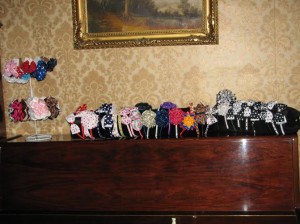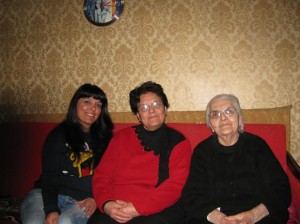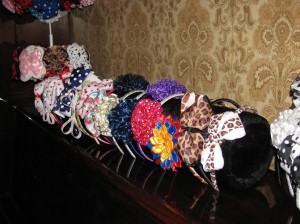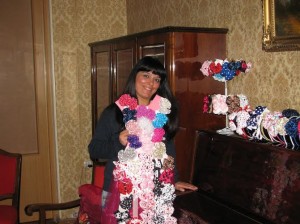Huri Berberian: “Aleppo, my memory, my longing, my melancholy, you must get back on your feet!”
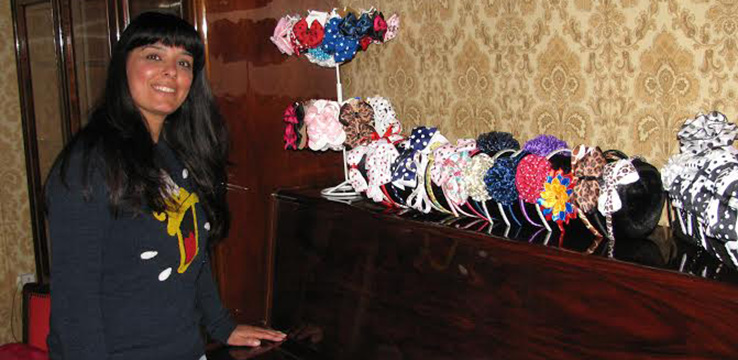
I have not been surprised by the tasty dishes, unique pastry, spices and handmade items made by the Syrian-Armenians for a long time now, but I always admire and take pride in the Syrian-Armenians’ works that don’t seem to be made by hand. This time I admired the vivid hats and caps made by Huri Berberian. I feel happy just by looking at them. It seemed as though they had filled Huri’s rented apartment with light…In that light, three luminescent girls of three generations greeted me. They were descendants of the Armenians of Zeytun with the image of an Armenian woman-Grandmother Ovsanna (Kirejian), Huri’s mother, Mrs. Diruhi and Huri. We talked about Aleppo, which is in a state of war, as well as Armenia and Huri’s beautiful works.
“We have been living in Armenia for a year-and-a-half. Due to the war, we left our hometown, our house and our jobs. I was an educator at Haigazian School. I would also make handmade items. I would use the computer to design the items. I was in charge of making the handmade items for the school. On the occasion of Easter, New Year, Motherhood and Beauty Day and other holidays, I would make models, as well as draw images on textile and cardboards. The children would also work and take their works home. The children at the kindergarten would learn how to make handmade works at the age of three. I came here and continued to do what I love to do. I have achieved all this on my own. My mother and grandmother have not taught me anything. They also make tasty meals.
The women in our hometown didn’t need to work very much. Our men worked, and one man’s job was enough to maintain a family of five or six. We had a job, a house and were living in peace…We weren’t thinking about working, but the youth were starting to use their brains. They were seeking jobs, working in certain fields and expressing themselves. Due to the war, many teachers were laid off. We had four Armenian schools that were all centralized in one school and, many teachers obviously lost their jobs. So, I decided to make caps in different styles and preferred to design caps for small girls.
I couldn’t find any other job in Armenia due to the language barrier. The locals use many Russian words and words of dialects a lot. I don’t understand them. They also speak very fast, and I have a hard time understanding what they say. Many locals don’t understand us when we speak in Western Armenian. So, I started making caps and selling them, but sales aren’t going too well. I give them to stores. I have also participated in the exhibition-sale organized by the RA Ministry of Diaspora and other exhibitions. There is demand, and the caps are sold more or less, but business isn’t doing too well since I don’t know the city well and don’t have a big circle. So, I need someone to help me and provide me with guidance. This is a new life, new environment and new customs…It is hard to adapt. We lost many things in this war, including our homes, schools, districts, acquaintances, relatives, a part of our lives, our carefree life and joy…It’s a good thing we have a Homeland and compatriots who surround us with warmth and care for us…When we had just arrived, they helped us by providing us with food and clothes and paying our rent…I attend English language courses, make handmade items, and my mother and grandmother stay at home and make meals. We live and dream of Aleppo and our house every day…There are so many memories! When the war ends, and Aleppo becomes what it used to e, we will go back, but I don’t think this war will end soon since it is a war for oil, gas and petroleum. I don’t think the Syrian-Armenians having moved to a third country will return to Syria after the war. You ask me what the Homeland means to me. We had always dreamed about the Homeland. Syrian-Armenians, especially the Armenians of Aleppo have strong faith and are very patriotic and conventional. We have always gone to church and participated in masses and liturgies. We have also celebrated all church and traditional Armenian holidays. Even here I go to the Saint Gregory the Illuminator Church. In my hometown, there were no sects or sectarians. Unfortunately, they are very widespread in Armenia. The Homeland of my dreams is the Homeland where there is one faith and one Armenian Apostolic Church. I also dream of seeing us Armenians as a unified nation, though we are small in number. I was moved and suffered a lot (and not only me, but also the entire Armenian community of Syria) when the earthquake hit Armenia and when the borders of Artsakh and Armenia were in danger. It is a pity that the Homeland of my dreams was very dreamlike. It is beautiful and cordial, but it still needs to become strong so that all the Armenians live the good life and never leave Armenia. I love Armenia, but I miss my hometown Aleppo very much. I was born, raised and received my education there. Every day, we pray for the well-developed, conventional Armenian community of Aleppo rich in spiritual values (Huri gets emotional, I also get emotional. There is a moment of silence. The girl cries and has trouble ending her heartfelt words). In the end, Huri says: “Aleppo, my memory, my longing, my melancholy, my love, you must get back on your feet!”
Our interview ended with the touching and spontaneous prayer of Huri Berberian, and it seems as though Grandmother Ovsanna and Mrs. Diruhi seal Huri’s touching words by convincing her that “everything is going to be alright.”
Karine Avagyan




 Արևելահայերեն
Արևելահայերեն Արևմտահայերեն
Արևմտահայերեն Русский
Русский